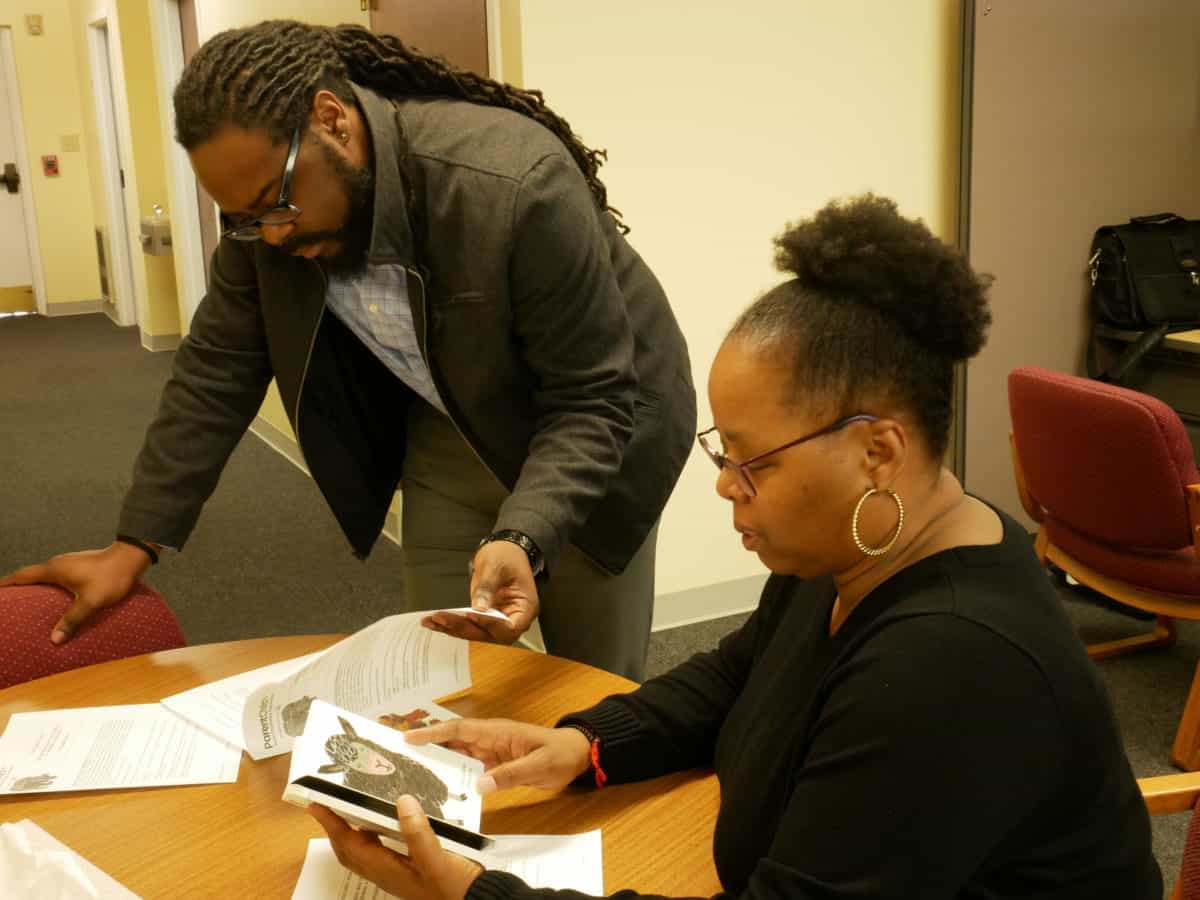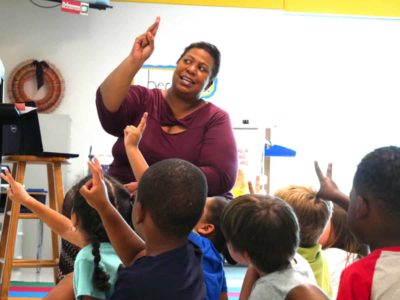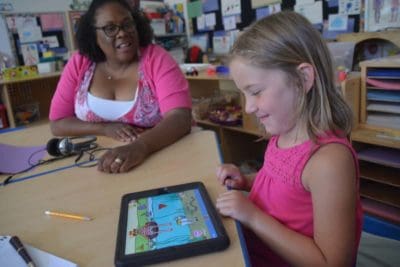
Natasha Curry didn’t know her 3-year-old son knew what a stop sign was.
“He can barely see over his car seat,” Curry said. “It was kind of shocking.”
Since Curry signed up for ParentChild+, she has had four visits from an early learning specialist who brings toys, books, activities, and parent guidance into her home in Southside Homes, a subsidized-housing apartment complex in Charlotte. The home-visiting program for 2- and 3-year-olds, with sites in 14 other states, aims to increase school readiness and strengthen learning and language exposure in the home.
Research shows that the human brain develops most rapidly in the first three years of life. Sarah Walzer, CEO of ParentChild+, said the program, which targets low-income families, engages students during a critical time when they often are left without outside learning support before pre-K.
“The goal is to be working with them for the two years before they would enter a pre-K classroom, and to be very actively engaged with them on making sure their child finds their way to a pre-K classroom,” Walzer said.
Early learning specialists are trained to inform parents on options for pre-K. In Charlotte, and across the state, finding the right fit, determining eligibility, and enrolling can be a confusing process.
“We know that for families that we’re working with, that’s an important bridge,” Walzer said.
Sign up for Early Bird, our newsletter on all things early childhood.
For Curry, part of the reason she was interested in the program was her experience with her three older children. She said she already thinks she has learned easy strategies to foster learning with her son.
“With my other three kids, I was actually working so much I kind of missed out on that a little bit,” Curry said. “And my middle daughter got behind a little bit. I don’t want that to happen again.”
The early childhood experience affects academic success later in school and life, research shows. A child who is proficient in reading by third grade is four times less likely to drop out of high school.
The website for ParentChild+ shares some outcomes from research by outside evaluators: Program graduates are 50% more likely to be prepared for kindergarten, enter school performing 10 months beyond their age and outperform their peers in third-grade math tests, and are 50% less likely to be placed in special education services.
“We want children to walk into a classroom, be familiar with the materials, have the language and social/emotional skills to navigate the classroom, to relate to the teacher, to their peers, and that’s really what’s critical to setting children on a pathway to school success,” Walzer said. “If you fail kindergarten because you’ve never seen any of those things before and you don’t know what to do with them, think about what that means for first grade and for second grade and for third grade.”
In Charlotte, Walzer said, ParentChild+ got involved in response to a 2014 Harvard University study that ranked the city last in economic mobility among the country’s 50 largest cities.
GreenLight Fund gave the program $600,000 over four years in May 2019 as part of an effort to “give Charlotte a way to match the most urgent needs of low-income residents with the country’s best social innovations,” the organization’s website reads. The Charlotte program received about another $400,000 from Vanguard, ParentChild+, Charlotte Bilingual Preschool, and Inlivian (formerly Charlotte Housing Authority).
The program spans two 23-week cycles, with two visits each week. Each visit requires an early learning specialist to share a toy or a book, follow a guide of activities related to that item, and record progress of student learning, social/emotional development, and the strength of the parent’s educational interactions.
“We want to reinforce the educational connection between parent and child,” said Angela Drakeford, the program’s North Carolina director.
The program hopes to be serving 100 families by June split between two sites: Southside, where Curry lives, and families who live near Charlotte Bilingual Preschool. The school, Drakeford said, wanted to participate because of recent drops it has seen in student readiness.
As a lifelong Charlotte resident, Drakeford is passionate about the program making a difference and expanding its reach throughout the city and state. She calls the program “a no-judgment zone.”
“If there’s no furniture in the house, for one, we’re going to make sure we call Crisis to see if we can get you some, and for two, we’re going to sit on the floor with you and meet with that family,” Drakeford said. “That’s why I love working with Inlivian, because they carry that same spirit: Meet families where they are.”
Inlivian is the home of ParentChild+ in the community. Tomico Evans, executive vice president of Core Programs Inc. within Inlivian, says that home visiting has always been a part of their programming but that the educational components that ParentChild+ is bringing the community are new.
The early learning specialists who go into homes are Inlivian employees. They have direct connections with resources outside of ParentChild+ that can benefit the families they serve. Xavier Dunbar, a program coordinator who oversees the early learning specialists and conducts visits himself, was once a case manager for Inlivian.
“Establishing that relationship is being understanding of what circumstances that a family is going through and being able to provide resources outside of the ParentChild+ program,” Dunbar said. “With Inlivian, you have access to a case manager, or we can assist with beds, food, referrals for mental health or substance abuse,” Dunbar said. “Essentially whatever it is that is preventing that family from being able to reach a level of self sufficiency … we have to be very resourceful.”
Dottie Stowe, a part-time early learning specialist, has lived in Southside Homes for 11 years. As someone who was at first resistant to trust Inlivian, Stowe said she has worked with ParentChild+ to make sure the program is interactive with the community. More informational sessions and a large fair are planned in the coming months.
“It’s like family now,” Stowe said of the fact that families now know Dunbar and the other early learning specialist. “We became family before actually going into the homes.”
Editor’s Note: A previous version of this article stated Greenlight Fund gave ParentChild+ $1 million in May 2019. The fund gave the home visiting program $600,000.
Recommended reading



